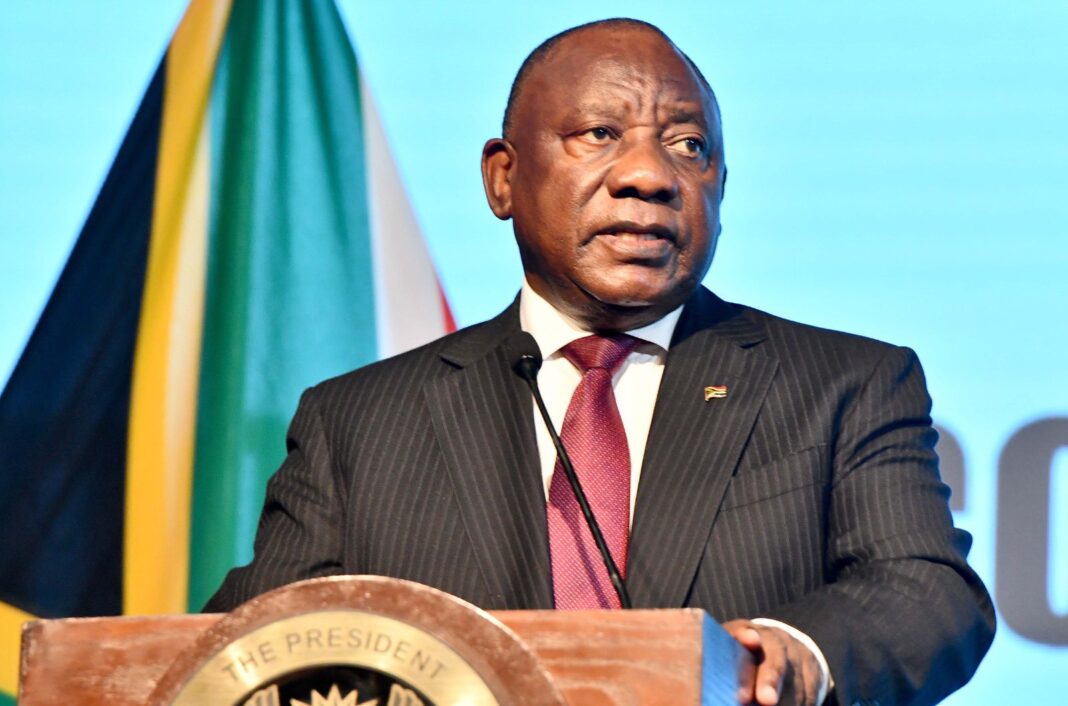Inside Politics Reporter
After making the nation wait for an hour, President Cyril Ramaphosa finally appeared on SABC to address South Africa and to announce the long-awaited news of what the Cabinet of his Government of National Unity would look like.
Ramaphosa started by saying that following discussions over the course of the last few weeks, a total of eleven parties have elected to work together in government and in Parliament.
Absent from the list was former President Jacob Zuma’s MK party and Julius Malema’s Economic Freedom Fighters although earlier reports had said the ANC was in talks with the two parties.
The President named the parties that have agreed to be part of the GNU as the African National Congress, Democratic Alliance, Patriotic Alliance, Inkatha Freedom Party, Good Party, Pan Africanist Congress of Azania, Freedom Front Plus, United Democratic Movement, Al Jama-ah, Rise Mzansi and the United Africans Transformation.
Ramaphosa said the partnership between the GNU parties is guided by a Statement of Intent, which outlines fundamental principles and a minimum programme of priorities.
All the parties have made a commitment to respect the constitution and to promote accountable and transparent governance, evidence-based policy and decision-making, the professionalisation of the public service, integrity and good governance, he said.
He stressed that the incoming government will prioritise rapid, inclusive and sustainable economic growth and the creation of a more just society by tackling poverty and inequality.
“The establishment of the Government of National Unity in its current form is unprecedented in the history of our democracy,” he said.
“We have had to consider how to form the new government in a manner that advances the national interest, that gives due consideration to the outcome of the election and that makes use of the respective capabilities within each of the parties.
“We have had to consider not only the immediate needs of the country. We have also had to consider the stability, effectiveness and durability of the government we are establishing.
“It is true that some South Africans have expressed concern about the length of time it has taken to form a government. As the discussions have unfolded, they have been worried about the effect of a protracted process on confidence and stability.
“At the same time, many people have pointed to the experiences of other countries that have a far longer history of democracy, where the formation of multi-party governments have sometimes taken several months.”
Ramaphosa said South Africa, as a relatively young democracy should be proud that it has moved to establish a government comprised of eleven parties within such a short space of time that have been able to build consensus on the tasks of the government.
“We have shown that there are no problems that are too difficult or too intractable that they cannot be solved through dialogue. In forming the National Executive, we have had to consider several factors and advance a number of key principles.
“We have had to ensure that the incoming government will be effective, and that it will have people with the experience, skills and capabilities to deliver on its mandate. It is important that we deploy into positions of responsibility people who are committed, capable and hard-working, and who have integrity.
“We have had to ensure that all the parties are able to participate meaningfully in the National Executive and that the diversity of the views of South Africans is properly reflected,” he said.
Ramaphosa said he sought to ensure that the National Executive is representative of the people of South Africa, giving due consideration to gender, youth, demographics and regional distribution.
“Given the challenges that the country faces today and considering the electoral mandate this government must implement, I have decided to make certain changes to the national government portfolios.
“In the course of the sixth democratic administration, we indicated our intention to reduce the number of portfolios in the National Executive. However, due to the need to ensure that the National Executive is inclusive of all the parties to the Government of National Unity, this has not been possible.
“In some instances, we have considered it necessary to separate certain portfolios to ensure that there is sufficient focus on key issues”.
Ramaphosa announced the following changes to Ministries:
The ministries of Electricity and Energy will be merged. The Minister of Electricity and Energy is Kgosientsho Ramokgopa, the Deputy Minister of Electricity and Energy is Samantha Graham.
There will be a separate ministry of Mineral and Petroleum Resources.Gwede Mantashe is the Minister of Mineral and Petroleum Resources with Judith Nemadzinga‐Tshabalala as the Deputy Minister.
The ministry of Agriculture will be separated from the ministry of Land Reform and Rural Development. The Minister of Agriculture is John Steenhuisen, and the Deputy Minister of Agriculture is Rosemary Nokuzola Capa.
PAC leader Mzwanele Nyhontso is the new Minister of Land Reform and Rural Development, and former Limpopo Premier Chupu Stanley Mathabatha as the Deputy Minister.
The ministry of Higher Education will be separated from the ministry of Science, Technology and Innovation. The Minister of Science, Technology and Innovation is Blade Nzimande, and the Deputy Minister of Science, Technology and Innovation is Nomalungelo Gina.
The Minister of Higher Education is Nobuhle Nkabane, and Buti Manamela and Mimmy Gondwe are deputies.
The ministry of Justice and Constitutional Development will be separated from the ministry of Correctional Services. The Minister of Justice and Constitutional Development is Thembi Nkadimeng, and Andries Nel as deputy minister.
The Minister of Correctional Services is Pieter Groenewald, and the Deputy Minister of Correctional Services is Lindiwe Ntshalintshali.
There will no longer be a Ministry of Public Enterprises. The coordination of the relevant public enterprises will be located in the Presidency during the process of implementing a new shareholder model.
INSIDE POLITICS



